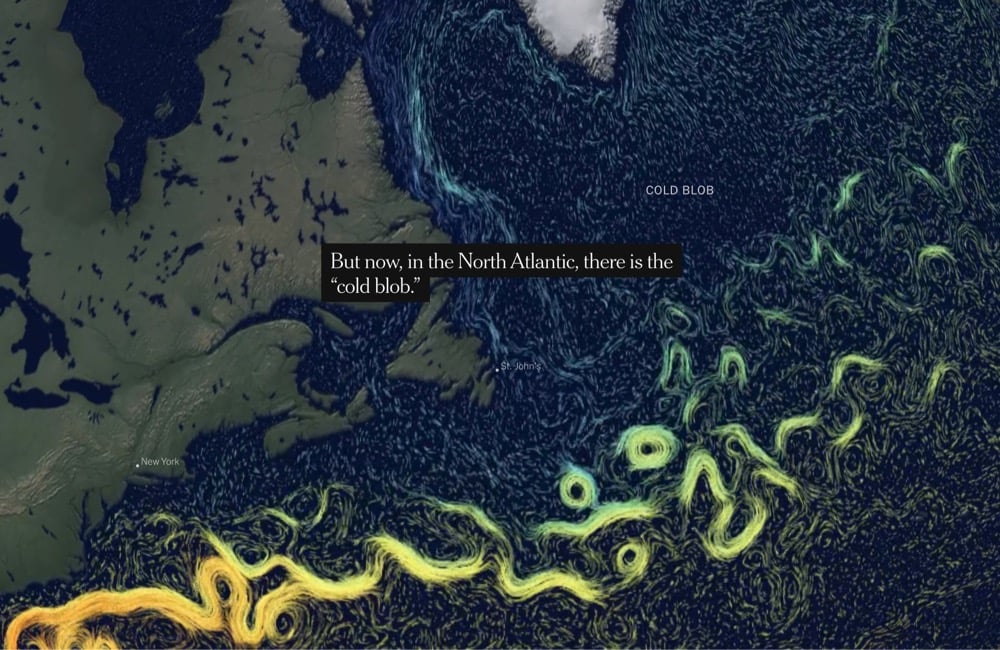The Gulf Stream, the Cold Blob, and a Potentially Frozen Europe

The NY Times has a fantastic interactive piece about a particularly disturbing aspect of the climate crisis: the evidence that a huge Atlantic circulation pattern is weakening and could collapse, leading to “a monstrous change” in temperature, precipitation, and other chaotic effects across the globe.
Now, a spate of studies, including one published last week, suggests this northern portion of the Gulf Stream and the deep ocean currents it’s connected to may be slowing. Pushing the bounds of oceanography, scientists have slung necklace-like sensor arrays across the Atlantic to better understand the complex network of currents that the Gulf Stream belongs to, not only at the surface, but hundreds of feet deep.
“We’re all wishing it’s not true,” Peter de Menocal, a paleoceanographer and president and director of the Woods Hole Oceanographic Institution, said of the changing ocean currents. “Because if that happens, it’s just a monstrous change.”
The consequences could include faster sea level rise along parts of the Eastern United States and parts of Europe, stronger hurricanes barreling into the Southeastern United States, and perhaps most ominously, reduced rainfall across the Sahel, a semi-arid swath of land running the width of Africa that is already a geopolitical tinderbox.
One of the potential reasons for this weakening is that the quickly melting Greenland ice sheet is dumping massive amounts of cold fresh water into the North Atlantic, disrupting the Gulf Stream. This is “the cold blob”.
The northern arm of the Gulf Stream is but one tentacle of a larger, ocean-spanning tangle of currents called the Atlantic Meridional Overturning Circulation, or AMOC. Scientists have strong evidence from ice and sediment cores that the AMOC has weakened and shut down before in the past 13,000 years. As a result, mean temperatures in parts of Europe may have rapidly dropped to about 15 degrees Celsius below today’s averages, ushering in arctic like conditions. Parts of northern Africa and northern South America became much drier. Rainfall may even have declined as far away as what is now China. And some of these changes may have occurred in a matter of decades, maybe less.
The AMOC is thus a poster child for the idea of climatic “tipping points” — of hard-to-predict thresholds in Earth’s climate system that, once crossed, have rapid, cascading effects far beyond the corner of the globe where they occur. “It’s a switch,” said Dr. de Menocal, and one that can be thrown quickly.
Which brings us to the cold blob. Almost everywhere around the world, average temperatures are rising — except southeast of Greenland where a large patch of the North Atlantic has become colder in recent years.
The title of this post references a “frozen Europe” but because the Earth is a nonlinear system, a weakened AMOC could actually have the opposite effect:
Scientists at the U.K.’s National Oceanography Centre have somewhat counterintuitively linked the cold blob in the North Atlantic with summer heat waves in Europe. In 2015 and 2018, the jet stream, a river of wind that moves from west to east over temperate latitudes in the northern hemisphere, made an unusual detour to the south around the cold blob. The wrinkle in atmospheric flow brought hotter-than-usual air into Europe, they contend, breaking temperature records.
“That was not predicted,” said Joel Hirschi, principal scientist at the centre and senior author of the research. It highlights how current seasonal forecasting models are unable to predict these warm summers. And it underscores the paradox that, far from ushering in a frigid future for, say, Paris, a cooler North Atlantic might actually make France’s summers more like Morocco’s.
(thx, meg)





Stay Connected